And annoyed by their chi - Study guides, Class notes & Summaries
Looking for the best study guides, study notes and summaries about And annoyed by their chi? On this page you'll find 16 study documents about And annoyed by their chi.
Page 2 out of 16 results
Sort by
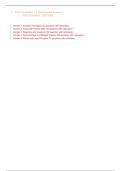
-
ANCC IQ Domain 1-5
- Exam (elaborations) • 116 pages • 2024
-
- $20.48
- + learn more
ANCC IQ Domains 1-5 Questions and Answers o THIS DOCUMENT CONTAINS: Domain 1: Scientific Foundation (40 questions with rationales) • Domain 2: Advanced Practice Skills (49 questions with rationales) • Domain 3: Diagnosis and Treatment (52 questions with rationales) • Domain 4: Psychotherapy and Related Theories (30 questions with rationales) • Domain 5: Ethical and Legal Principles (72 questions with rationales) ANCC IQ Domain • Domain 1: Scienti...
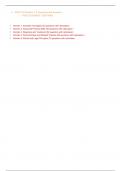
-
ANCC IQ Domain 1-5
- Exam (elaborations) • 116 pages • 2024
-
- $13.48
- + learn more
ANCC IQ Domains 1-5 Questions and Answers o THIS DOCUMENT CONTAINS: Domain 1: Scientific Foundation (40 questions with rationales) • Domain 2: Advanced Practice Skills (49 questions with rationales) • Domain 3: Diagnosis and Treatment (52 questions with rationales) • Domain 4: Psychotherapy and Related Theories (30 questions with rationales) • Domain 5: Ethical and Legal Principles (72 questions with rationales) ANCC IQ Domain • Domain 1: Scienti...
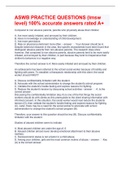
-
ASWB PRACTICE QUESTIONS (lmsw level) 100% accurate answers rated A+
- Exam (elaborations) • 23 pages • 2023
-
Available in package deal
-
- $14.99
- + learn more
ASWB PRACTICE QUESTIONS (lmsw level) 100% accurate answers rated A+ Compared to non abusive parents, parents who physically abuse their children A. Are more easily irritated, and annoyed by their children. B. Have no knowledge or understanding of child development. C. Are more permissive. D. Rely on physical punishment more often. Your Answer should be A. Despite extensive research in the area, few specific characteristic have been found that distinguish abusive parents from non-abusive...
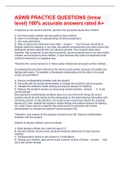
-
ASWB PRACTICE QUESTIONS (lmsw level) 100% accurate answers rated A+
- Exam (elaborations) • 23 pages • 2023
-
Available in package deal
-
- $12.99
- + learn more
ASWB PRACTICE QUESTIONS (lmsw level) 100% accurate answers rated A+ Compared to non abusive parents, parents who physically abuse their children A. Are more easily irritated, and annoyed by their children. B. Have no knowledge or understanding of child development. C. Are more permissive. D. Rely on physical punishment more often. Your Answer should be A. Despite extensive research in the area, few specific characteristic have been found that distinguish abusive parents from non-abusive...
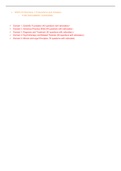
-
ANCC IQ Domains 1-5 Questions and Answers
- Exam (elaborations) • 116 pages • 2023
-
- $17.49
- + learn more
ANCC IQ Domains 1-5 Questions and Answers o THIS DOCUMENT CONTAINS: Domain 1: Scientific Foundation (40 questions with rationales) • Domain 2: Advanced Practice Skills (49 questions with rationales) • Domain 3: Diagnosis and Treatment (52 questions with rationales) • Domain 4: Psychotherapy and Related Theories (30 questions with rationales) • Domain 5: Ethical and Legal Principles (72 questions with rationales) ANCC IQ Domain • Domain 1: Scientific Found...

-
ANCC IQ domain Questions And Answers With Rationales| 2023 update
- Exam (elaborations) • 18 pages • 2023
-
- $18.49
- + learn more
ANCC IQ domain Questions And Answers With Rationales| 2023 updateANCC IQ Domains 1-5 Qbank answered all correctly answered; latest updated summer. As a PMHNP, you are aware of antipsychotic medication side effects. Which of the following side effects of antipsychotic medications has an insidious, delayed-onset typically 1 to 2 years after initiation of the medication? a. Dry mouth b. Tardive dyskinesia c. Sedation d. Weight gain In evaluating a 4-year-old, one would expect which of the...

Do you wonder why so many students wear nice clothes, have money to spare and enjoy tons of free time? Well, they sell on Stuvia! Imagine your study notes being downloaded a dozen times for $15 each. Every. Single. Day. Discover all about earning on Stuvia


